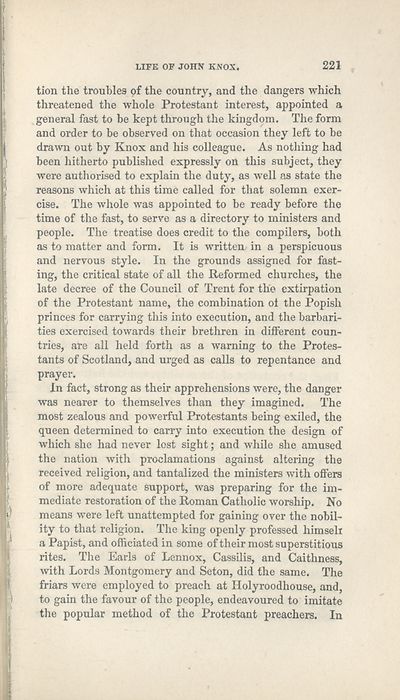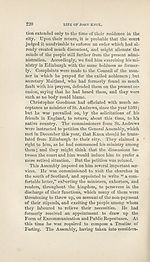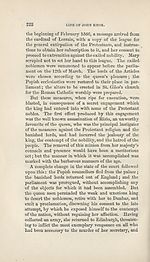Download files
Complete book:
Individual page:
Thumbnail gallery: Grid view | List view

LIFE OF JOHN KNOX.
221
tion the troubles of the country, and the dangers which
threatened the whole Protestant interest, appointed a
general fast to be kept through the kingdom. The form
and order to be observed on that occasion they left to be
drawn out by Knox and his colleague. As nothing had
been hitherto published expressly on this subject, they
were authorised to explain the duty, as well as state the
reasons which at this time called for that solemn exer¬
cise. The whole was appointed to be ready before the
time of the fast, to serve as a directory to ministers and
people. The treatise does credit to the compilers, both
as to matter and form. It is written^ in a perspicuous
and nervous style. In the grounds assigned for fast¬
ing, the critical state of all the Reformed churches, the
late decree of the Council of Trent for the extirpation
of the Protestant name, the combination oi the Popish
princes for carrying this into execution, and the barbari¬
ties exercised towards their brethren in different coun¬
tries, are all held forth as a warning to the Protes¬
tants of Scotland, and urged as calls to repentance and
prayer.
In fact, strong as their apprehensions were, the danger
was nearer to themselves than they imagined. The
most zealous and powerful Protestants being exiled, the
queen determined to carry into execution the design of
which she had never lost sight; and while she amused
the nation with proclamations against altering the
received religion, and tantalized the ministers with offers
of more adequate support, was preparing for the im¬
mediate restoration of the Roman Catholic worship. No
means were left unattempted for gaining over the nobil¬
ity to that religion. The king openly professed himseh
a Papist, and officiated in some of their most superstitious
rites. The Earls of Lennox, Cassilis, and Caithness,
with Lords Montgomery and Seton, did the same. The
friars were employed to preach at Holyroodhouse, and,
to gain the favour of the people, endeavoured to imitate
the popular method of the Protestant preachers. In
221
tion the troubles of the country, and the dangers which
threatened the whole Protestant interest, appointed a
general fast to be kept through the kingdom. The form
and order to be observed on that occasion they left to be
drawn out by Knox and his colleague. As nothing had
been hitherto published expressly on this subject, they
were authorised to explain the duty, as well as state the
reasons which at this time called for that solemn exer¬
cise. The whole was appointed to be ready before the
time of the fast, to serve as a directory to ministers and
people. The treatise does credit to the compilers, both
as to matter and form. It is written^ in a perspicuous
and nervous style. In the grounds assigned for fast¬
ing, the critical state of all the Reformed churches, the
late decree of the Council of Trent for the extirpation
of the Protestant name, the combination oi the Popish
princes for carrying this into execution, and the barbari¬
ties exercised towards their brethren in different coun¬
tries, are all held forth as a warning to the Protes¬
tants of Scotland, and urged as calls to repentance and
prayer.
In fact, strong as their apprehensions were, the danger
was nearer to themselves than they imagined. The
most zealous and powerful Protestants being exiled, the
queen determined to carry into execution the design of
which she had never lost sight; and while she amused
the nation with proclamations against altering the
received religion, and tantalized the ministers with offers
of more adequate support, was preparing for the im¬
mediate restoration of the Roman Catholic worship. No
means were left unattempted for gaining over the nobil¬
ity to that religion. The king openly professed himseh
a Papist, and officiated in some of their most superstitious
rites. The Earls of Lennox, Cassilis, and Caithness,
with Lords Montgomery and Seton, did the same. The
friars were employed to preach at Holyroodhouse, and,
to gain the favour of the people, endeavoured to imitate
the popular method of the Protestant preachers. In
Set display mode to:
![]() Universal Viewer |
Universal Viewer | ![]() Mirador |
Large image | Transcription
Mirador |
Large image | Transcription
| Antiquarian books of Scotland > Scotland/Scots > Life of John Knox ; and, The life of Alexander Henderson > (239) |
|---|
| Permanent URL | https://digital.nls.uk/131835172 |
|---|
| Description | Thousands of printed books from the Antiquarian Books of Scotland collection which dates from 1641 to the 1980s. The collection consists of 14,800 books which were published in Scotland or have a Scottish connection, e.g. through the author, printer or owner. Subjects covered include sport, education, diseases, adventure, occupations, Jacobites, politics and religion. Among the 29 languages represented are English, Gaelic, Italian, French, Russian and Swedish. |
|---|

